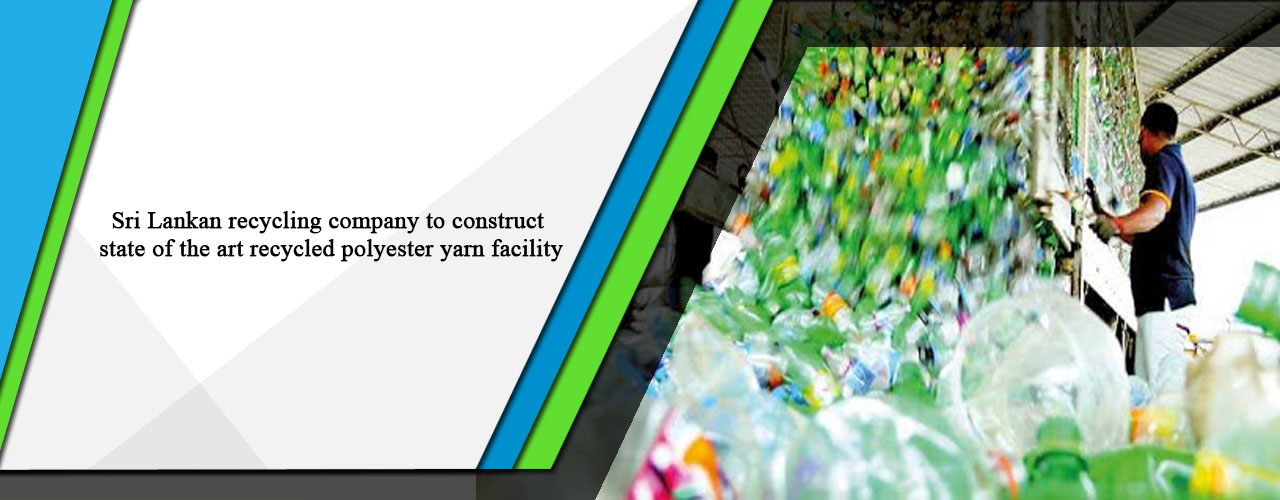Sri Lankan recycling company to construct state of the art recycled polyester yarn facility
A Sri Lankan plastic bottle recycler and manufacturer of polyester yarn and monofilaments, Eco-Spindles Ltd, has reportedly commenced Phase 2 of its expansion strategy to add 20,000 sq.ft of production space at its state-of-the-art facility in the Western Province of the country.
Once completed, the expanded facility is expected to double the polyester yarn production capacity at Eco-Spindles.
The foundation stone was laid by Secretary to Sri Lanka’s Ministry of Environment Dr. Anil Jasinghe together with Central Environmental Authority (CEA) Director General P.B. Hemantha Jayasinghe, Board of Investment (BOI) of Sri Lanka Horana Export Processing Zone Senior Deputy Director Sujeewa Thilakumara, Ministry of Mahaweli Development and Environment, Environmental Pollution Control and Chemical Management Division Director S.M. Werahera, BPPL Holdings Managing Director and Chief Executive Officer Dr. Anush Amarasinghe and Eco-Spindles Ltd. Deputy General Manager Manoj Udawatte in the presence of other senior representatives from Eco-Spindles.
“We are excited to be laying the foundation for the continued growth of Eco-Spindles, and the greater sustainability of our nation. All over the world, people are waking up to the urgent need to create and enter a circular economy. The expansion of our Horana facility is another vital step in this direction,” BPPL Holdings Managing Director and CEO Dr. Anush Amarasinghe has been quoted as saying.
A wholly owned subsidiary of BPPL Holdings PLC, Eco-Spindles, is Sri Lanka’s only value-added exporter of polyethylene terephthalate (PET) waste bottles in Sri Lanka, and is on a mission to reverse the island’s environmental degradation by converting PET bottle waste, that would otherwise end up polluting sensitive eco-systems, into export quality products that have since captured extensive market share across the globe, local media reports stated.
“As the only other entity in the world that is capable of directly manufacturing polyester yarn out of recycled PET flakes, we are extremely well-positioned to capture the rapidly increasing demand for such products. In this manner we are able to generate vital foreign exchange for the national economy, while at the same time, helping to reverse one of the most serious environmental threats of our time using a raw material that we had all considered to have only one use. These are exactly the kind of solutions that hold the key to a sustainable future for Sri Lankans today, and for all future generations,” Dr. Amarasinghe has stated.
The demand for recycled yarn has seen an increase globally among leading international fashion brands now utilizing large quantities of yarn in different product families through local mills every year. This demand will inevitably continue to rise as sustainability is becoming a topic of utmost importance in all countries.
Eco-Spindles, is equipped with the resources to generate 700 tons of recycled polyester yarn per annum and once the expanded production facilities are completed, this capacity is targeted to increase by a further 900 tons in the annual production.
Dr. Amarasinghe has reportedly said that while it is still acutely evident that current supply is nowhere near the demand and has expressed confidence that the Eco-Spindles strategy for expansion will promote substantial direct and indirect opportunities for all stakeholders, while raising awareness on the immense potential that the local recycling sector still has to offer for investors looking to make a difference.
OSL take:
Sri Lankan authorities are focused on developing efficient waste disposal mechanisms. Therefore foreign businesses could explore opportunities in Sri Lanka’s sustainable development sectors. Waste disposal is one area that has posed new business opportunities. Renewable power generation as well as agriculture are two other sectors with immense growth potential. Foreign businesses/investors could explore opportunities in Sri Lanka.
| Article Code : | VBS/AT/20210217/Z_6 |

